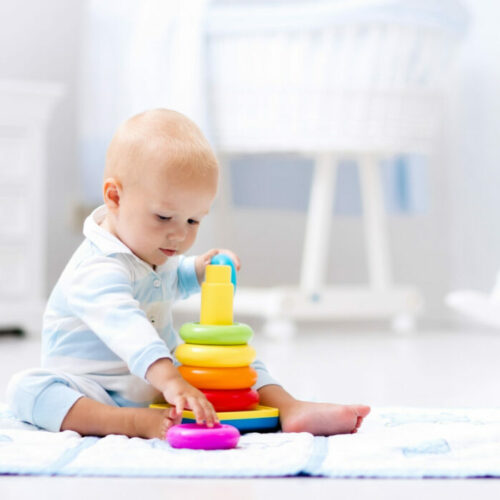Quiet activities to replace naptime

All toddlers eventually grow out of naptime but this doesn’t have to spell the end of that late afternoon period of peace. Here we explore the ‘quiet time’ activities that can replace napping.
A regular nap time for little ones is often the only chance during the day when mums can take a moment for themselves and relax, before the busyness of the day resumes. There comes a time (all too soon for some of us!) when children no longer need to take a nap in the middle of the day. The telltale signs include your child being more hesitant to fall asleep and maybe even wanting to do an activity instead. If this happens, you may simply have to accept that the time for regular naps has passed.
There is good news though! The end of daytime shut-eye doesn’t necessarily have to mean the end of those precious few moments of calm in the afternoon. Just because your little one no longer has to sleep during the day, it doesn’t mean that they don’t need a short period of rest. Often naptime can be smoothly replaced with a time for quiet activities. This down time means that your child will be able to rest while entertaining themselves with an activity, and you will be able to take a brief but well-deserved break.
No more naptime
The need for naps will pass for the majority of children before they’re five years of age. Some stop drifting off during the day as young as two and half years old. If your little one is trying to avoid naptime, or they’re waking up from their nap earlier than usual, it often means that they no longer require this afternoon siesta.
Another sign that the end of regular napping is around the corner, is that your child will sleep during naptime but will wake up earlier in the morning, or even in the middle of the night. This is due to the fact that they’ve already had enough sleep and a full night’s sleep has become too much for them. To address their new needs, and to make sure they sleep through the night, it’s advisable to gently move your child away from midday naps.
However, if your little one is made to transition straight from a regular nap to a full day of activities, they may get too tired and their sleeping routine will be disrupted. This is where restful activities come in – a planned period of ‘quiet time’ that encourages your toddler to mindfully engage with something, while also getting some rest.
Restful activities for toddlers
Engaging with restful activities will guarantee some down time for children and parents alike, as well as having a restorative effect on your little one, ensuring that they’ll be re-energised and ready for whatever else the day has in store. Here are a few options try with your toddler:
Colouring
Colouring is an absolute favourite ‘quiet time’ activity for so many children. In recent years, mindful colouring has been adopted by huge numbers of adults as a way to intentionally relax and unplug from their busy lives. Little ones are no different! Set your toddler up with a selection of colouring pencils and some paper or a colouring book, and encourage them to let their imaginations run wild.
A regular colouring practice will provide an opportunity for your toddler to relax without having to take a nap. It also develops their creativity and fine motor skills. You never know – you may want to pick up your own colouring book and try your hand at some mindful colouring too!
Audiobooks
Listening to audiobooks is a wonderful activity for little ones needing some mid-afternoon relaxation. With almost countless options available, your child can be transported to fantastic different worlds brimming with entertaining stories, all while relaxing in their favourite cosy spot at home. Audiobooks can replicate the calming nature of a bedtime story and, as such, are often very soothing for toddlers. This results in a genuinely restorative period of the day where children can get some down time while still having fun.
Building blocks
A period of free time to play with building blocks is another great ‘quiet time’ activity for little ones who have grown out of napping. Lego is the natural choice, with virtually endless ways for your child to explore their imagination. It’s recommended for younger children to start with Duplo as each piece is bigger. This means that it’s both less of a choking hazard and more manageable to handle as your toddler is still developing their dexterity.
Puzzles and brainteasers
Puzzles and brainteasers present unique ways to help your child unwind, while keeping their mind engaged. The emphasis here should still be on fun and there shouldn’t really be any pressure to replace naptime with purely educational time. However, if your toddler can enjoy relaxing while figuring out a puzzle, it’s a win-win situation! There are plenty of puzzle books filled with word searches, crosswords and much more, so why not try one out with your little one.
A piece of advice
One final piece of advice is to try to avoid bringing screens into the equation. These activities are supposed to be a restorative and gentle part of the day. While there are fabulous videos and apps that will keep your little one engaged, they may in fact tire your toddler out rather than giving them the afternoon boost they really need. So stick to analogue options where possible and make the most of your own ‘quiet time’ while your child is enjoying theirs.
Image Credit: Shutterstock











Comments